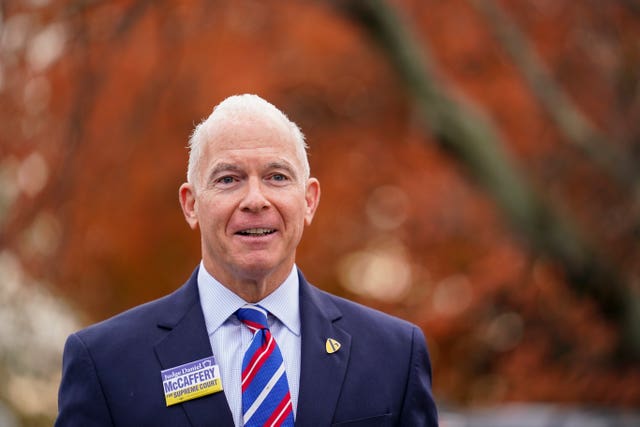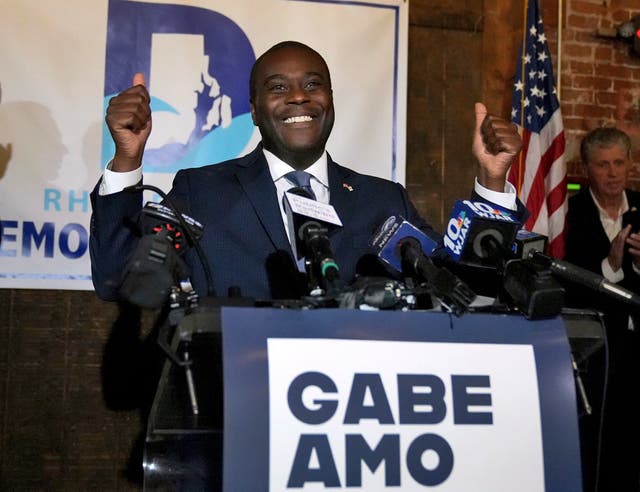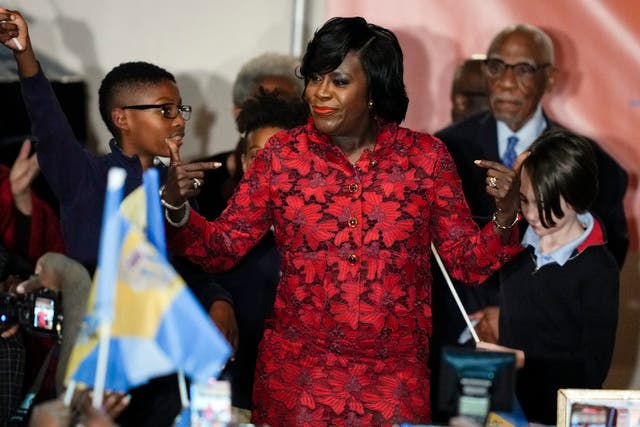
US Democrats have had plenty of good news during off-year elections – including more evidence that they can win races centred on the debate over abortion in America.
Abortion rights supporters won an Ohio ballot measure, and the Democratic governor of Kentucky stayed in office by campaigning on reproductive rights while painting his opponent as extremist.
A Democrat also won an open seat on the Pennsylvania supreme court after campaigning on his pledge to uphold abortion rights.
And Democrats took full control of the Virginia statehouse, blocking Republicans from being able to pass new abortion restrictions. This also had a wider significance, delivering a defeat to governor Glenn Youngkin that could halt a growing buzz about his possible late entry into the Republican presidential primary race.

The victories are not widely considered to be enough to make Democrats feel secure heading into next year’s presidential election.
Tuesday’s off-year elections – polls that takes place in neither a presidential election nor at mid-term – have major implications in all of those states and provide a snapshot of American politics heading into 2024.
The two big names – Joe Biden and Donald Trump – were not on the ballot this time. How Americans view them will be a huge factor in shaping next year’s presidential race.
Democrats notched two early wins in Kentucky and Ohio, states that voted for Mr Trump in 2020. In both states, abortion was the main campaign issue.
Kentucky governor Andy Beshear was re-elected in a state that Mr Trump had won by 26 percentage points.
Mr Beshear had criticised the abortion views of his Republican challenger, Attorney General Daniel Cameron, in debates and television ads.

One Beshear ad featured a woman who miscarried after being raped by her stepfather at age 12 expressing disbelief at Mr Cameron’s opposition to abortion in cases of rape and incest.
In Ohio, a ballot measure preserving abortion rights passed in a state that Mr Trump won by eight percentage points in 2020.
Republicans had already tried to derail the measure by calling an unusual August referendum to make it harder to pass ballot measures, an initiative that was roundly rejected by Ohio voters.
Dan McCaffery won an open seat on Pennsylvania’s supreme court after positioning himself as a defender of abortion rights. And in Virginia, Democrats held the state senate and flipped control of the Virginia House of Delegates from the Republicans.
The outcomes suggest a transformed political landscape since a conservative majority in the US supreme court overturned a federal right to an abortion last year.

Abortion rights measures have passed in a plethora of states as some other Republican-run states instituted new bans on the procedure.
However, abortion rights may not be a potent enough issue to swing an election on its own. Several Republican governors who supported new bans cruised to re-election in last year’s mid-terms, including Ohio’s Mike DeWine, Florida’s Ron DeSantis and Texas’ Greg Abbott.
But abortion was the key issue across the country on Tuesday, which should worry Republicans facing competitive races next year.
It was a good night for Democrats following a series of wins in special elections and comes after a stronger performance in last year’s mid-terms, which are usually crushing for the party in power in Washington.
But none of the races were an up-or-down decision on the incumbent president, Mr Biden. And none featured former president Mr Trump on the ballot or his ability to turbocharge turnout of infrequent voters.

Democrats have performed well in recent special elections and did better than expected in 2022. It increasingly seems like the party starts from a position of strength.
But it is not clear that strength translates to its 80-year-old president, who faces widespread scepticism about his job performance and whether he is too old to serve a second term.
Mr Trump, widely seen as the man who will challenge Mr Biden in a rematch of the 2020 poll next year, is 77.
The Democrats’ strong showing only went so far. The party invested heavily in an unlikely place: Mississippi, where Brandon Presley, best known as Elvis Presley’s second cousin, was challenging Republican governor Tate Reeves.
The party hoped that Mr Presley’s celebrity and political skills, coupled with the change in a centuries-old provision originally designed to keep black candidates from winning state-wide races, could spell an unlikely victory. But it was not to be, as Mr Reeves won the race.

There are limited lessons to draw from a party falling short in a state its 2020 presidential candidate lost by 17 points, except one of the oldest: you can’t win ’em all.
Meanwhile, candidates broke barriers in a handful of wins elsewhere.
Former Biden White House aide Gabe Amo will become the first black member of congress from Rhode Island after winning the special election in that state’s first congressional district.
The son of West African immigrants, Mr Amo emerged from a 12-candidate primary in September to succeed retiring representative David Cicilline.
On Tuesday, Mr Amo defeated Republican Gerry Leonard, a Marine veteran, in the heavily Democratic district.
And Philadelphia will have its first female mayor after Democrat Cherelle Parker defeated Republican David Oh in the overwhelmingly Democratic city.


Comments: Our rules
We want our comments to be a lively and valuable part of our community - a place where readers can debate and engage with the most important local issues. The ability to comment on our stories is a privilege, not a right, however, and that privilege may be withdrawn if it is abused or misused.
Please report any comments that break our rules.
Read the rules here